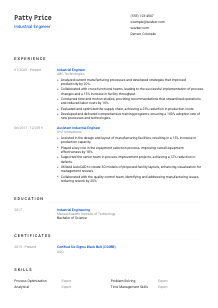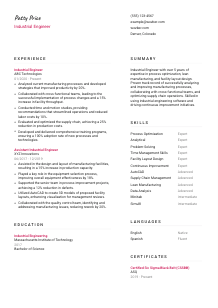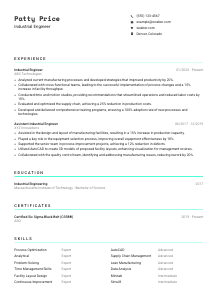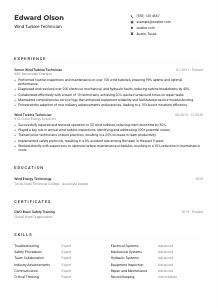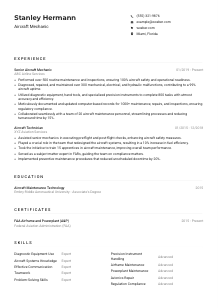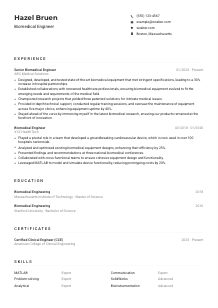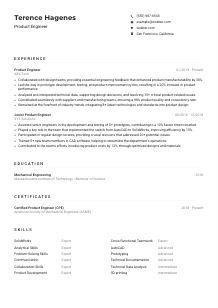Industrial Engineer CV Example
Optimizing processes, but feeling rusty about your CV? Dive into this Industrial Engineer example, shaped with Wozber free CV builder. See how smoothly you can streamline your manufacturing mastery to align with job specifics, sculpting a career narrative as efficiently as your production lines!
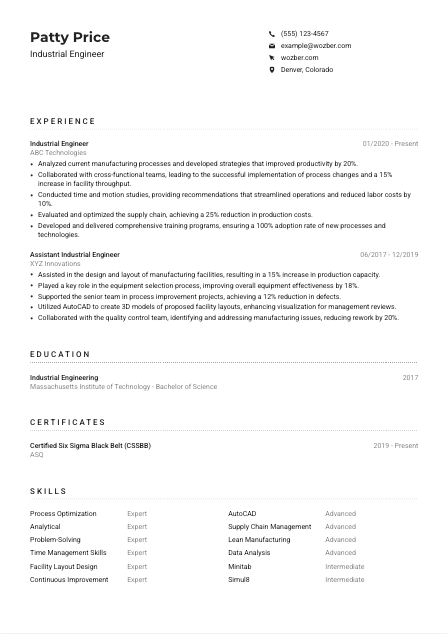
How to write an Industrial Engineer CV?
Eager to spotlight your engineering prowess in the industrial domain? Your CV is the linchpin in this endeavor, acting as a powerful testament to your capabilities. Through meticulous crafting with the Wozber free CV builder, this comprehensive guide will steer you towards creating a CV that's not just a document, but a compelling narrative reflecting your industrial engineering splendor. Let's gear up to transform your CV into a beacon that not only meets but surpasses job requirements, perfectly primed for the keen eyes of hiring managers and Applicant Tracking Systems (ATS).
Personal Details
The 'Personal Details' section might seem rudimentary, yet it's the cornerstone of your professional persona. Here's how to refine this section for the Industrial Engineer role, ensuring it resonates with the specific nuances of the profession.
1. Your Name Is Your Brand
Think of your name as the headline of your professional story. Ensure it's highlighted with clarity, using a font that's both professional and easy on the eyes. Consider making it a touch larger to catch immediate attention.
2. Job Title Precision
Placing the target job title, "Industrial Engineer," directly beneath your name bridges your identity with your career aspirations. It's a swift stroke that tells hiring managers, 'This is the role I'm mastered for.'
3. Essential Contact Info
- Phone Number: Your contact number is your direct line. Ensure it's current and typo-free, representing a reliable pathway for potential employers to reach out.
- Professional Email: Your email should be a blend of professionalism and simplicity. Standard formats like firstname.lastname@domain.com are always a safe bet.
4. A Nod to Location
Mentioning 'Denver, Colorado,' directly aligns with the job's geographic requirement, subtly assuring the hiring team of your availability and readiness, removing any potential concerns about relocation.
5. The Modern Digital Presence
In today's digital era, including a LinkedIn profile or a professional website can set you apart, showcasing a broader professional landscape. Ensure it's updated and mirrors the dedication you're bringing to the table.
Takeaway
Think of the 'Personal Details' section as the initial handshake with your potential employer. It's your opportunity to make a polished and professional first impression. By aligning your information with the targeted role, you're laying a solid foundation for the rest of your CV. Remember, precision and professionalism in these details set the stage for your narrative.





Experience
The 'Experience' section is your arena to demonstrate how perfectly your career trajectory matches the Industrial Engineer role. Below, we'll dissect how to shape this section to align with the job description provided, spotlighting your achievements.
- Analyzed current manufacturing processes and developed strategies that improved productivity by 20%.
- Collaborated with cross‑functional teams, leading to the successful implementation of process changes and a 15% increase in facility throughput.
- Conducted time and motion studies, providing recommendations that streamlined operations and reduced labor costs by 10%.
- Evaluated and optimised the supply chain, achieving a 25% reduction in production costs.
- Developed and delivered comprehensive training programs, ensuring a 100% adoption rate of new processes and technologies.
- Assisted in the design and layout of manufacturing facilities, resulting in a 15% increase in production capacity.
- Played a key role in the equipment selection process, improving overall equipment effectiveness by 18%.
- Supported the senior team in process improvement projects, achieving a 12% reduction in defects.
- Utilized AutoCAD to create 3D models of proposed facility layouts, enhancing visualization for management reviews.
- Collaborated with the quality control team, identifying and addressing manufacturing issues, reducing rework by 20%.
1. Dissect the Job Description
Initiate by breaking down the job description's requirements. In our case, phrases like 'process optimisation' and 'collaborating with cross-functional teams' are golden nuggets that should reflect in your experience.
2. The Structure of Success
Layout your experience in a reverse-chronological order, spotlighting your recent achievements first. For each role, make sure to list your job title, employer, and dates of employment, clearly laying the groundwork for your accomplishments.
3. Tailor Your Triumphs
Craft accomplishment statements that resonate with the job requirements. Quantify your achievements, like 'improved productivity by 20%' or 'reduced production costs by 25%', to give a tangible measure of your impact.
4. Quantify Your Impact
Whenever possible, anchor your achievements with numbers. It not only adds credibility but also gives hiring managers a clear picture of what you can bring to their team.
5. Relevancy is Key
Keep your focus laser-sharp. Exclude any unrelated achievements no matter how impressive they might seem. Every line should aim directly at the Industrial Engineer role you're aspiring for.
Takeaway
Consider your 'Experience' section as the heart of your CV. It's where you get to showcase your journey, aligning it precisely with what the role demands. Reflect on your achievements, tailor them to fit the job description, and present them confidently. Your career story is compelling; ensure it speaks directly to the needs of your future employer.
Education
While the 'Education' section seems straightforward, it's another crucial piece of your CV puzzle. Let's dive into how to make this section work for you, reinforcing your eligibility for the Industrial Engineer position.
1. Identify the Education Benchmark
Pinpoint the educational prerequisites from the job posting. In our example, a 'Bachelor's degree in Industrial Engineering or a related field' is a must-have, setting the baseline for your educational qualifications.
2. Structure for Clarity
Maintain a crisp format: Start with your degree, followed by the field of study, your university's name, and the graduation date. This simple structure eases readability and allows quick scanning.
3. Direct Match is Crucial
When the job specifies a particular degree, it's non-negotiable. If you've earned a 'Bachelor of Science in Industrial Engineering,' ensure it's prominently listed to directly match the job's requirements.
4. Relevant Courses or Projects
Though not always necessary, spotlighting relevant coursework or projects can bolster your education section, especially if they align closely with the job's needs or demonstrate practical experience.
5. Other Academic Honors
Mention any academic achievements or extracurricular involvement that reinforces your fit for the role. Remember, this is more about quality than quantity; only include those that strengthen your candidacy.
Takeaway
Your education section is a reflection of your academic dedication and a foundation for your expertise. Ensure it resonates with the employer's expectations and stands as proof of your readiness for the role. With each detail, you're not just ticking boxes; you're showcasing the depth of your knowledge and commitment to your field.
Certificates
In the industrial engineering landscape, certifications can significantly elevate your professional profile. Here's how to strategically present your certifications, ensuring they align with the job requirements and demonstrate your commitment to continuous learning.
1. Map to Job Requirements
Start by revisiting the job posting. In our case, 'Certification in Six Sigma or Lean Manufacturing is preferred.' Highlight any certifications you have that meet these preferred qualifications.
2. Prioritize Relevance
Focus on listing certifications that are directly relevant to the job. This approach ensures that hiring managers immediately see the value you bring, aligned with the role's specific needs.
3. Transparency with Dates
Include the date of acquisition for each certification, especially if they are recent or require renewal. This shows your up-to-date involvement and proficiency in the field.
4. Commit to Continual Learning
The industrial engineering field is ever-evolving. Display a commitment to staying on the cutting edge by continuously updating your certifications and seeking new learning opportunities aligned with your career goals.
Takeaway
Let your certifications section tell a story of dedication, specialization, and a relentless pursuit of excellence. Aligning this with the job's specifics not only elevates your candidacy but also showcases your proactive approach to professional development. Remember, each certification is a building block towards your goal, adding depth to your professional narrative.
Skills
In the realm of industrial engineering, showcasing a robust set of skills is paramount. Let's navigate through otimizing your 'Skills' section, ensuring it perfectly aligns with the job requirements and reinforces your candidacy.
1. Unpack the Job Description
Delve into the job posting with a fine-tooth comb, identifying both explicitly stated and implied skills. For the Industrial Engineer role, skills like 'Process Optimisation,' 'Lean Manufacturing,' and proficiency in 'AutoCAD' are key.
2. Curate Your Skills List
Highlight skills that directly match the job description, striking a balance between hard and soft skills. Ensure your expertise in areas like 'Facility Layout Design' and 'Time Management' is evident, painting a complete picture of your capabilities.
3. Organisation and Clarity
Keep your skills section organized and focused. Avoid overstuffing it with every skill you possess. Prioritize those that align closely with the job's requirements, ensuring they catch the hiring manager's eye.
Takeaway
Approach the 'Skills' section as your personal showcase, an opportunity to impress upon the hiring manager that you are an unparalleled match for the role. Each skill you list is a testament to your potential, painting you as not just a candidate, but the candidate for the job. Regularly refining and updating this section keeps your CV fresh and your skillset sharp.
Languages
In today's interconnected world, multilingual abilities can significantly bolster your CV. Let's explore how to tailor the 'Languages' section to reflect your linguistic skills and their relevance to the Industrial Engineer position.
1. Check Job Language Requirements
First, determine if the job posting specifies language skills. For our example, 'English language skills are a core requirement.' Ranking your English proficiency as 'Native' directly aligns with this need.
2. Prioritize Job-Specific Languages
If the job description mentions specific languages, list them prominently in your CV. Your proficiency level should be clear, whether it's 'Native,' 'Fluent,' or 'Intermediate.'
3. Broaden Your Linguistic Portfolio
Even if not explicitly required, additional languages can be an asset. They showcase your adaptability and capacity to engage in diverse work environments. List them in order of proficiency.
4. Honesty in Proficiency
Be transparent about your language skills, using terms that accurately reflect your proficiency. This honesty builds trust and sets realistic expectations.
5. Gauge the Role's Global Scope
For positions that have a global reach or involve working with diverse communities, your multilingual abilities can be a significant advantage. Highlighting these skills could set you apart in a pool of candidates.
Takeaway
Your linguistic proficiency is more than just a section on your CV; it's your passport to a world of opportunities. In the global industrial engineering landscape, every language you speak is a bridge to new cultures, ideas, and collaborations. Flaunt your multilingual capabilities with pride and view them as integral to your professional persona.
Summary
The summary section is your chance to provide a compelling overview of your qualifications, tailored specifically to the Industrial Engineer position. Let's refine this section to ensure it's a potent blend of your achievements and skills.
1. Digest the Job Essence
Begin with a deep understanding of the job requirements. Reflect on how your unique experiences and skills align with these needs.
2. Start Strong
Lead your summary with a statement that encapsulates your professional identity and your experience level, such as, 'Industrial Engineer with over 5 years of expertise in process optimisation and lean manufacturing.'
3. Address Key Requirements
Highlight your skills and achievements that directly link to the job description. Demonstrating your proven track record in areas like 'supply chain optimisation' and 'facility layout design' reinforces your fit for the role.
4. Precision and Brevity
Your summary should be concise, focusing on the most compelling aspects of your candidacy. Aim for a crisp, engaging narrative that encourages the hiring manager to delve deeper into your CV.
Takeaway
Think of your summary as the spotlight that highlights your journey, achievements, and the unique value you offer. Tailoring it to reflect the job description signals to employers that you're not just looking for any job – you're the perfect fit for this specific role. Let your summary sing your praises, setting the tone for the rest of your CV.
Launching Your Industrial Engineer Journey
Congratulations on completing a comprehensive guide to crafting an Industrial Engineer CV that stands out! Armed with these strategies and the power of Wozber's free CV builder, including ATS-friendly CV templates and the ATS CV scanner for keywords optimisation, you're now equipped to capture the attention of hiring managers and ATS alike. Your CV is more than a document; it's the key to unlocking your next big opportunity. Refine it, make it uniquely yours, and let it open doors to a fulfilling career in industrial engineering.
The future is bright. Let's engineer your success!

- Bachelor's degree in Industrial Engineering or a related field.
- Minimum of 3 years of experience in process optimization, facility layout design, or lean manufacturing.
- Proficiency in using industrial engineering software such as AutoCAD, Minitab, and Simul8.
- Strong analytical, problem-solving, and time management skills.
- Certification in Six Sigma or Lean Manufacturing is preferred.
- English language skills are a core requirement.
- Must be located in or willing to relocate to Denver, Colorado.
- Analyze current manufacturing processes and develop strategies for improvement in productivity, quality, and safety.
- Collaborate with cross-functional teams to implement process changes, equipment modifications, and facility expansions.
- Conduct time and motion studies, and provide recommendations for labor standards and staffing requirements.
- Evaluate and optimize supply chain operations to minimize costs and maximize efficiency.
- Develop and deliver training programs to ensure proper implementation of new processes and technologies.





